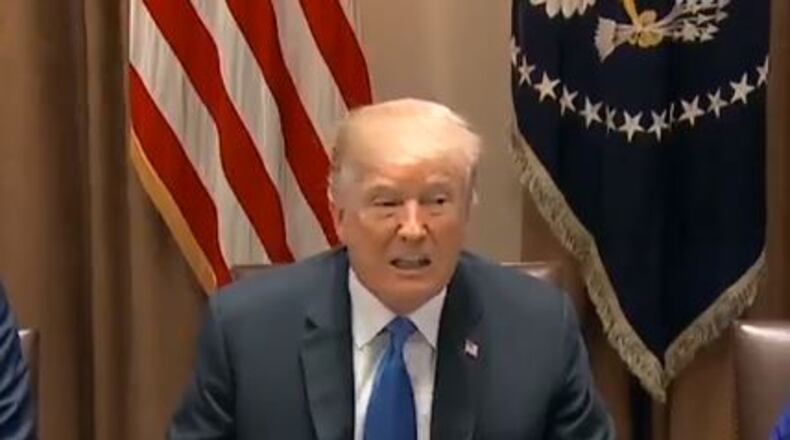Facing criticism from Republican Governors and GOP members of Congress over President Donald Trump's plans to slap new tariffs on imported steel and aluminum, the White House on Friday afternoon said the plan would apply to all nations that send such products to the United States, arguing there would be "virtually no price impact" on consumers from either of the new trade duties.
"There seems to be a fake news thread here that somehow modest and measured tariffs on aluminum and steel are going to cause massive inflation downstream," said a senior White House Official, who labeled press stories and criticism "hyperbole."
"The reality here is that this 10 percent tariff on aluminum can only increase the price of an entire six pack of beer by a little over a penny," the official said. "It's virtually nothing."
Along with the 10 percent tariff on imports of aluminum, there would be a 25 percent tariff on imports of steel.
While the President did not say this to reporters on Thursday, the official said Mr. Trump's tariff decision will be "an across-the-board tariff with no exclusions," applying to all other nations - and that it will only have positive economic effects.
"From an economic standpoint, there are virtually no impacts other than positive ones for two industries that we need," the official said.
Outside of Washington, D.C., the view was much different.
"If the President wants to protect good-paying, family-supporting jobs in America, especially here in Wisconsin, then he should reconsider the administration's position on these tariffs," said Republican Gov. Scott Walker of Wisconsin.
"I believe it invites a trade war that ultimately will work against American jobs and consumers," said Gov. John Kasich of Ohio said of the tariff decision.
"Let's be clear: The President is proposing a massive tax increase on American families," said Sen. Ben Sasse (R-NE).
Farm groups were particularly alarmed by the President's move, worried that they will be targeted first by countries which object to the new tariffs.
"These tariffs are very likely to accelerate a tit-for-tat approach on trade, putting U.S. agricultural exports in the crosshairs,” said Brian Kuehl, Executive Director for the group Farmers for Free Trade.
There were already reports of other nations considering retaliatory trade measures; Canadian Prime Minister Justin Trudeau labeled the U.S. plan "absolutely unacceptable."
Meanwhile in Europe, there were reports that Kentucky bourbon, Harley Davidson motorcycles, and other items might be targeted with import duties as payback.
If that sounded like the start of a trade war, that kind of talk didn't phase top Trump advisers.
"All we're doing here is defending this country against a global economic trading environment that disadvantages" the United States, the White House official said to reporters, repeatedly saying the extra tariffs would have no negative impact in the U.S. on consumers, trade or jobs.
Earlier on Friday morning, the President had made clear he was following through on his campaign pledge to shake up the global trading system, saying "trade wars are good, and easy to win."
About the Author
The Latest
Featured



